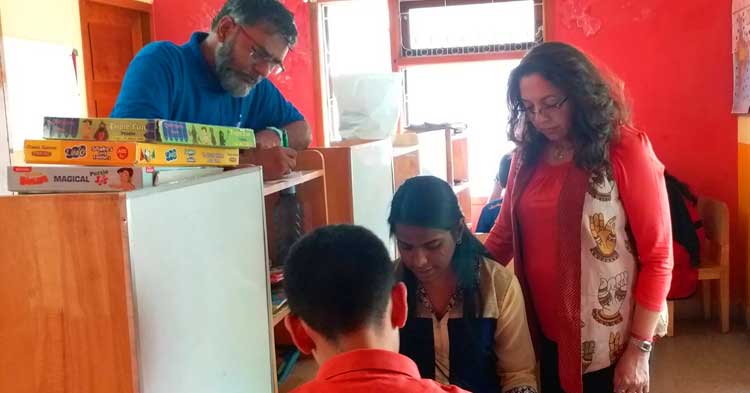Bhubaneswar: Dr Smita Awasthi, Trustee, Behaviour Momentum India Foundation, has pioneered ABA-based intensive 1:1 services in India in the field of special needs and provided a model self-sustainable organization. Having trained most of the resource pool working with children with autism in India and looking at the immense need for developing the quality of professionals, she started the first BACB Approved ABA course in India. Dr Awasthi was in Bhubaneswar recently and spoke to OMMCOMNEWS on an array of subjects related to autism. Here is an excerpt from the interview:

Dr Awasthi, it is a pleasure to have you amidst us. Please tell us about your journey. How did you step into this field? My first job was in the field of special needs.
As a young professional, I started working with UNICEF for community-based rehabilitation for special needs in 18 villages. I was also doing counselling. After 10 years of service in this field, I started focusing on children with autism. I felt the need to acquire new skills and learn research-based methods based on the high standards in Western societies. I wanted to bring those technologies to special needs families in India. I enrolled on a behaviour analysis course in the USA and started applying new techniques to help children with autism learn faster. I also started mentoring behaviour analysts and training behaviour technicians in different cities in India for providing 1:1 services to children. In these 10 years, we have nearly 100 behaviour analysts and 3000-4000 behaviour technicians. Many speech therapists, paediatricians and occupational therapists have added behaviour analysis to their qualifications. There is awareness of evidence-based intervention among pediatricians. Our conferences have built awareness in society. Corporate offices are providing employment to adults with autism. As a society, we have moved ahead. This is just the beginning. We have started moving in the right direction.
What is unique about the pioneering Applied Behaviour Analysis course you started in India? Could you please shed some light on it?
Behaviour Momentum India’s (BMI School) started the first and only online ABA Course, to develop a resource pool of Behavior Technicians and Behavior Analysts at the graduate and postgraduate levels. Behaviour technicians work directly with children with special needs. Any Grade XII pass student can join the course and become a behaviour technician. Today India needs a resource pool of nearly a million behaviour technicians. Orissa itself needs 20,000 behaviour technicians. These behaviour technicians are supervised and trained by Behavior Analysts on a weekly basis. This is a very hierarchical way of working and the Behavior Analyst is responsible for every child. After ABA- India made a presentation to the Ministry of Family Health and Welfare, the Government of India recognized“Behaviour Science” as an Approved treatment for Autism and other developmental disabilities. Applied Behavior Analysis is a science of Operant Learning which was developed in the 1960s by B.F. Skinner. Science gives us the best ways for teaching new skills and also reduce behaviours.
How effective is Early Intervention in Autism Treatment?
Autism is a neurological disorder. This means the neural connections in the brain are wired differently. The child has difficulties in taking inputs from the environment especially related to language, and social interactions. At an early age, there is higher neuroplasticity and the developmental gaps are less. When we start providing early and intensive treatment to a very young child the developmental gaps should reduce. The intensive intervention of 30 hours a week will help bridge the gaps and many children’s autism symptoms will be alleviated. As symptoms of autism can be detected from 9 months – 2 years, the earlier the detection the faster therapy can be started. Note: There is no medical treatment for autism, although medical treatments are present for comorbidities such as epilepsy, sleep difficulties or ADHD symptoms.
What role does a parent of a child with autism have in the development of his/her child?
Parents have a vital role in the well-being of any child, especially children with autism. When there is a collaboration between the parent and the professional, it makes therapy much easier. Parents go through varying emotional stages at various points when they have a child diagnosed with special needs. These vary from grief, denial, acceptance, aggression, blame, panic and resignation. However, as children with autism spend much more time with their parents as compared to a therapist their contribution to reshaping their children’s future is phenomenal. This can best happen when there is close collaboration between the parent and the professional. The collaboration between parent and professional needs to be an honest partnership focussing on the child’s development with positivity, hope and nurturance.
Recently, I attended a programme where there was an excellent dance performance by autistic children. After the programme, one girl with autism came up to me, showed a lot of affection, and said ‘I am famous’. The girl amazed me as I instantly knew given the right intervention and close coordination between family and professionals will go a long way to reduce her symptoms.
Has society changed its attitude towards children with autism or their families?
Our society needs to become much more sensitive towards families with children with autism and other special needs. People who have not seen children with autism or don’t have them as neighbours don’t realise the pain and difficulties the family, especially the parents have to go through. Once a lady spent an hour making a festival Rangoli at her door and as soon as she went inside, a boy with autism who lived next door and was their family friend went and stamped all over and spoilt the Rangoli. That incident led to anger and bitterness in the friendship. Our society needs to be empathetic and understanding towards families with children with autism. Some simple rules they can follow are not to stare if a child looks different, ask parents if they need help if they are your neighbours, not to embarrass them or give any unwanted advice and let them have a way in queues. These small gestures will make our society inclusive.
What do you find lacking in taking forward your mission more smoothly and faster?
Treating a child with autism is an intensive process and it needs daily therapy, counselling and principles of behaviour analysis (ABA) is evidence-based and proven. Therapy for a child with autism starts in a 1:1 setting. Group therapy is only possible for an autistic child slowly. 1;1 therapy 30 hours a week is needed seven days a week. While early diagnosis is happening with autism prevalence at 1: 58 there is an acute shortage of professionals who can cater to millions of families with children with autism. 1 therapist can only work with 3 kids with autism. This gap is staring us in the face. We need an exponential increase in resources, which means more trainers, therapists, supervisors and behaviour analysts.
Do you expect anything from the government?
Yes, we do. When a child is autistic families have to make lots of compromises to help their child. One parent has to give up his job, making things even more difficult financially. At the same time, providing proper treatment to an autistic child is expensive because it is 1:1 and also intensive. So, we want the government to make policy changes to resolve these issues. The government should support the development of the much-needed resource pool, encourage insurance schemes, provide extra facilities for smooth travel as children with autism have difficulties in waiting, and help us start courses for behaviour technicians and behaviour analysts. Support private initiatives for advocacy and awareness. There can be Apps for prevalence studies so that resource planning can be done. It is important that like any healthy child, an autistic child and their family should be provided with all opportunities to lead a normal life and contribute to society.
What would give you the greatest satisfaction while treating an autistic child?
I will achieve the greatest satisfaction if the children we; (me and my team at BMI) work with learn at their maximum potential. We aim to help children with special needs overcome all their obstacles, including language disorders and challenging behaviours and can be independent and live productive life contribute to society. Many autistic children are very intelligent, have excellent memory and can learn things very quickly. Establishing them in jobs and in mainstream society is our goal. Having spoken to many employers we often find behavioural issues and soft skills as barriers to employment. Here, professionals like me play an important role. We need to analyse the behaviour and help in the inclusion process. When I achieve this even with one child, it gives me great satisfaction. Finally, I can create a huge resource pool in evidence-based practice (ABA).



















